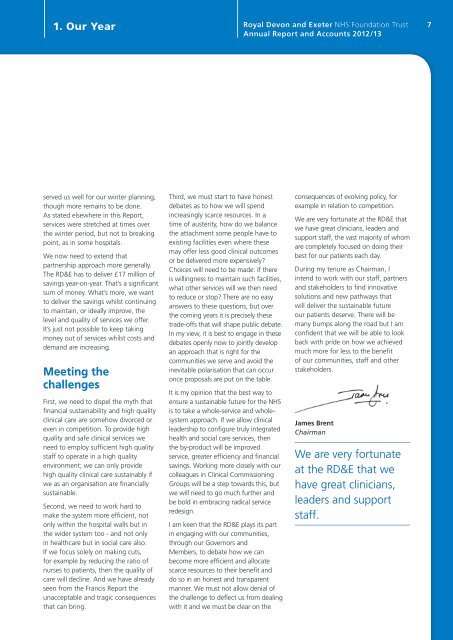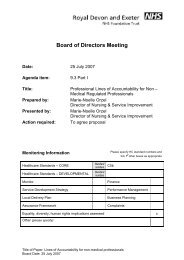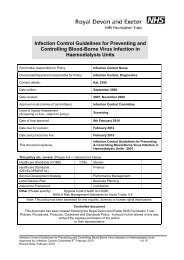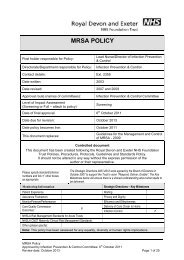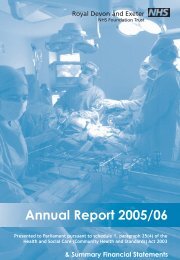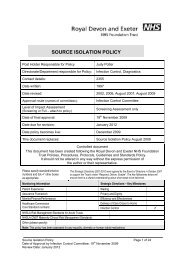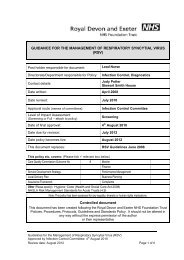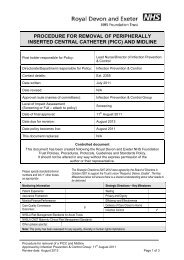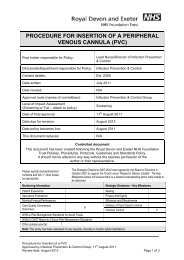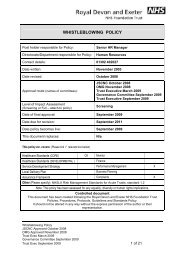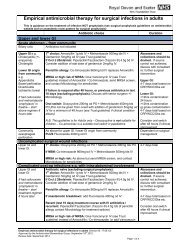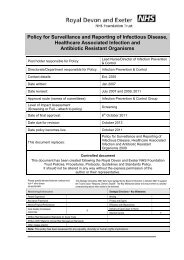Annual Report and Accounts 2012/13 - Royal Devon & Exeter Hospital
Annual Report and Accounts 2012/13 - Royal Devon & Exeter Hospital
Annual Report and Accounts 2012/13 - Royal Devon & Exeter Hospital
You also want an ePaper? Increase the reach of your titles
YUMPU automatically turns print PDFs into web optimized ePapers that Google loves.
1. Our Year<br />
<strong>Royal</strong> <strong>Devon</strong> <strong>and</strong> <strong>Exeter</strong> NHS Foundation Trust<br />
<strong>Annual</strong> <strong>Report</strong> <strong>and</strong> <strong>Accounts</strong> <strong>2012</strong>/<strong>13</strong><br />
7<br />
served us well for our winter planning,<br />
though more remains to be done.<br />
As stated elsewhere in this <strong>Report</strong>,<br />
services were stretched at times over<br />
the winter period, but not to breaking<br />
point, as in some hospitals.<br />
We now need to extend that<br />
partnership approach more generally.<br />
The RD&E has to deliver £17 million of<br />
savings year-on-year. That’s a significant<br />
sum of money. What’s more, we want<br />
to deliver the savings whilst continuing<br />
to maintain, or ideally improve, the<br />
level <strong>and</strong> quality of services we offer.<br />
It’s just not possible to keep taking<br />
money out of services whilst costs <strong>and</strong><br />
dem<strong>and</strong> are increasing.<br />
Meeting the<br />
challenges<br />
First, we need to dispel the myth that<br />
financial sustainability <strong>and</strong> high quality<br />
clinical care are somehow divorced or<br />
even in competition. To provide high<br />
quality <strong>and</strong> safe clinical services we<br />
need to employ sufficient high quality<br />
staff to operate in a high quality<br />
environment; we can only provide<br />
high quality clinical care sustainably if<br />
we as an organisation are financially<br />
sustainable.<br />
Second, we need to work hard to<br />
make the system more efficient, not<br />
only within the hospital walls but in<br />
the wider system too - <strong>and</strong> not only<br />
in healthcare but in social care also.<br />
If we focus solely on making cuts,<br />
for example by reducing the ratio of<br />
nurses to patients, then the quality of<br />
care will decline. And we have already<br />
seen from the Francis <strong>Report</strong> the<br />
unacceptable <strong>and</strong> tragic consequences<br />
that can bring.<br />
Third, we must start to have honest<br />
debates as to how we will spend<br />
increasingly scarce resources. In a<br />
time of austerity, how do we balance<br />
the attachment some people have to<br />
existing facilities even where these<br />
may offer less good clinical outcomes<br />
or be delivered more expensively?<br />
Choices will need to be made: if there<br />
is willingness to maintain such facilities,<br />
what other services will we then need<br />
to reduce or stop? There are no easy<br />
answers to these questions, but over<br />
the coming years it is precisely these<br />
trade-offs that will shape public debate.<br />
In my view, it is best to engage in these<br />
debates openly now to jointly develop<br />
an approach that is right for the<br />
communities we serve <strong>and</strong> avoid the<br />
inevitable polarisation that can occur<br />
once proposals are put on the table.<br />
It is my opinion that the best way to<br />
ensure a sustainable future for the NHS<br />
is to take a whole-service <strong>and</strong> wholesystem<br />
approach. If we allow clinical<br />
leadership to configure truly integrated<br />
health <strong>and</strong> social care services, then<br />
the by-product will be improved<br />
service, greater efficiency <strong>and</strong> financial<br />
savings. Working more closely with our<br />
colleagues in Clinical Commissioning<br />
Groups will be a step towards this, but<br />
we will need to go much further <strong>and</strong><br />
be bold in embracing radical service<br />
redesign.<br />
I am keen that the RD&E plays its part<br />
in engaging with our communities,<br />
through our Governors <strong>and</strong><br />
Members, to debate how we can<br />
become more efficient <strong>and</strong> allocate<br />
scarce resources to their benefit <strong>and</strong><br />
do so in an honest <strong>and</strong> transparent<br />
manner. We must not allow denial of<br />
the challenge to deflect us from dealing<br />
with it <strong>and</strong> we must be clear on the<br />
consequences of evolving policy, for<br />
example in relation to competition.<br />
We are very fortunate at the RD&E that<br />
we have great clinicians, leaders <strong>and</strong><br />
support staff, the vast majority of whom<br />
are completely focused on doing their<br />
best for our patients each day.<br />
During my tenure as Chairman, I<br />
intend to work with our staff, partners<br />
<strong>and</strong> stakeholders to find innovative<br />
solutions <strong>and</strong> new pathways that<br />
will deliver the sustainable future<br />
our patients deserve. There will be<br />
many bumps along the road but I am<br />
confident that we will be able to look<br />
back with pride on how we achieved<br />
much more for less to the benefit<br />
of our communities, staff <strong>and</strong> other<br />
stakeholders.<br />
James Brent<br />
Chairman<br />
We are very fortunate<br />
at the RD&E that we<br />
have great clinicians,<br />
leaders <strong>and</strong> support<br />
staff.


